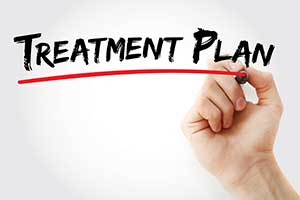Get Help - Find a Rehab Center Today

For help finding an addiction treatment center, Call us!
All calls are 100% confidential and free
1-877-882-9275Medically Reviewed by
Article Summary
Why is it important to have a treatment plan prepared ahead of time?
A successful intervention ends with the addict agreeing to pursue treatment for their addiction. Unfortunately, while this agreement is a victory for their loved ones and a promising start to what will hopefully be a lasting recovery, it is not usually long-lasting. Here is why.
Emotions Fade
Interventions are emotionally charged gatherings. The power of those emotions can often convince an addict to agree to treatment. The thought of losing contact with loved ones, for example, may create motivation to agree to treatment. Remorse at the impact of their addictions can also deepen an addict's motivation to pursue treatment.
However, these emotions generally fade in intensity once the intervention is over. As their feelings settle, the addict may change their mind about treatment. Unless you have gotten them into a program already, they may not choose to go.
Unless they have immediate access to a program, they are far more likely to continue using than they are to wait for you to get them access to treatment. This means that you may only have a few hours, or less, to get them into a treatment program after they agree.
Withdrawal Hits
An addict is always living under the shadow of withdrawal - The physical and psychological effects of drugs and alcohol leaving the body. While often lasting only a few days or weeks, these symptoms can be very intense and even life-threatening.

Withdrawal symptoms can begin just a few hours after an addict's last intake of the addictive substance. The discomfort of these symptoms can encourage an addict to check into a detox program to get relief from their symptoms.
However, unless they have immediate access to a program, they are far more likely to continue using than wait for you to get them access to treatment. This means that you may only have a few hours, or less, to get them into a treatment program after they agree.
Life hits.
An addict's life revolves around their addiction. As a result, if allowed to return to their daily life after an intervention, they are likely to settle back into the habits of using that they are comfortable with. If they know they have time before attending rehab, they may go on a binge beforehand, which can be exceedingly dangerous. If they do not immediately enter a treatment program after the intervention, the chances of relapse become much greater.
Prepare ahead of time.
The best approach to helping an addict get treatment is to put a plan before the intervention. This means taking all of the following steps:
- 1.Find an appropriate addiction treatment center.
- 2.Obtain a bed in a residential treatment program.
- 3.Establish a payment plan for treatment.
- 4.Arrange transportation to the treatment facility.
- 5.Pack a bag for the addict and have it ready at the intervention.

In addition, the intervention should include a requirement that the addict attends treatment immediately. Putting off their entrance into rehab should be grounds for the consequences discussed in the intervention. Unless the addict gets help right away, they may never get help at all.
By preparing a treatment plan ahead of time, you can reduce the chances that the addict will change their mind and increase the chances that the intervention can lead to a life-saving and long-lasting recovery.
Sources:
Drug Rehabs by State:
- Alabama
- Alaska
- Arizona
- Arkansas
- California
- Colorado
- Connecticut
- Delaware
- Florida
- Georgia
- Hawaii
- Idaho
- Illinois
- Indiana
- Iowa
- Kansas
- Kentucky
- Louisiana
- Maine
- Maryland
- Massachusetts
- Michigan
- Minnesota
- Mississippi
- Missouri
- Montana
- Nebraska
- Nevada
- New Hampshire
- New Jersey
- New Mexico
- New York
- North Carolina
- North Dakota
- Ohio
- Oklahoma
- Oregon
- Pennsylvania
- Rhode Island
- South Carolina
- South Dakota
- Tennessee
- Texas
- Utah
- Vermont
- Virginia
- Washington
- West Virginia
- Wisconsin
- Wyoming
Other Drug and Alcohol Rehab Services:
National Non Profit Helpline - 1-877-882-9275
Our National Non Profit Helpline is a 24/7, 365-day-a-year treatment referral and information service for individuals and families faced with mental and/or substance use disorders.
All calls are strictly confidential
Our service provides referrals to licensed treatment facilities, support groups, and community-based organizations. You don't have to struggle alone with addiction. Help is just a phone call away. Call 1-877-882-9275 now to get the help you need and deserve.




